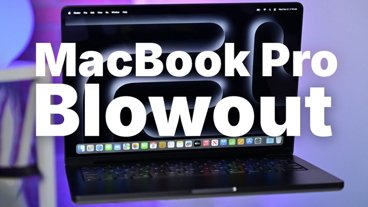The FaceBook-owned Oculus has started shipping the Go, a low-cost virtual reality headset that works without needing to be connected to a smartphone, Mac, or Windows PC, with the entry-level head-mounted display available to purchase in North America today.
Initially revealed in October, the Oculus Go is available to order from the official website today, as well as via online retailers Amazon and Newegg, and from Best Buy stores, with it available to purchase in a total of 23 countries. The base model, equipped with 32 gigabytes of storage, costs $199, while the 64-gigabyte capacity version is priced at $249.
A lower-cost way to experiment with virtual reality compared to the company's Rift headset, the Oculus Go is a host-independent device that does not require a secondary device to act as a hos. Instead of needing a smartphone or computer to render and display virtual worlds, the unit houses all of the necessary hardware within the main display unit, saving users from dealing with trailing cables.
Looked at through lenses, the Oculus Go has a 2,560 by 1,440 WQHD "fast-switch" LCD screen, while built-in speakers provide spatial audio, though other headphones or earphones could be used instead via its 3.5mm headphone jack. Accompanying the headset is a compact motion-sensitive controller, which has a trigger, a top touch surface, and back and home buttons.
The Go differs from other major headsets in that it provides a slightly simplified experience compared to its more expensive rivals. Users will only be able to glance around a room, rather than walk around it, and the use of a single controller also limits its applications for gaming.
A library of content is already available for the Go, due to its support for all titles that work on the Samsung Gear VR. Oculus' technology is used in Samsung's accessory, but unlike the Go, it requires the use of a Samsung smartphone for processing and for the display.
Part of the available content includes Oculus Rooms, which allows users to hang out with others, playing table-top games and consuming content together. Oculus Venues, launching May 30, will provide access to live events captured for VR, including concerts and sports.
Revealed today at Facebook's F8 event, Oculus TV will provide a virtual seating area and a large screen for users to watch TV shows and other content. Oculus TV will also operate as a hub for related VR apps, including Hulu and Showtime, with Pluto TV and Red Bull TV joining the roster in May, and ESPN later this year.
Aside from developing ARKit and showing how the Mac can be used to power VR experiences at WWDC 2017, Apple has not publicly shown much in the way of work in VR. The company has applied for numerous patents relating to the technology, including eye-tracking systems for VR and AR headsets, and there have been countless rumors concerning the development of smartglasses.
Recent rumors point to Apple working on a AR and VR headset codenamed "T288," equipped with 8K-resolution eyepieces and using WiGiG technology to minimize the use of cables. Current speculation suggests a 2020 launch for the supposed device.
 Malcolm Owen
Malcolm Owen









 Amber Neely
Amber Neely
 William Gallagher
William Gallagher



 Oliver Haslam
Oliver Haslam
 Thomas Sibilly
Thomas Sibilly

-m.jpg)






1 Comment
I am not sure strapping anything made by Facebook to your face is a good idea...